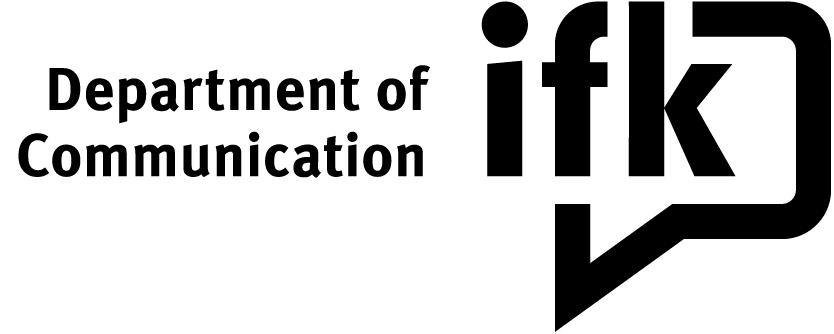Publications & Presentations
Publications
Kannengießer, S., Rettler, L., Röttger, U., & Stehle, H. (in print). Public relations and sustainability: Points of friction in a complex relationship. In F. Weder (Hrsg.), Strategic sustainability communication: Principles, perspectives and potential of communication for transformation. Wiesbaden: Springer.
Stehle, H., Lührmann, J., & Uth, B. (in print). Striving for legitimacy: Strategic energy project communication and its characteristics. In F. Weder (Hrsg.), Strategic sustainability communication: Principles, perspectives and potential of communication for transformation. Wiesbaden: Springer.
Walke, S., & Stehle, H. (in print). How civil society actors employ strategic communication to delegitimate corporations in public debates on sustainability. In F. Weder (Hrsg.), Strategic sustainability communication: Principles, perspectives and potential of communication for transformation. Wiesbaden: Springer.
Stehle, H. (2024). Merton (1949): Patterns of influence. In O. Hoffjann, & S. Sandhu (eds.), Schlüsselwerke für die Strategische Kommunikationsforschung (pp. 443-453). Wiesbaden: Springer VS. doi:10.1007/978-3-658-45292-6_39
Stehle, H., Bock, A., Wilhelm, C., Springer, N., Mahrt, M., Lobinger, K., Linke, C., Engelmann, I., Detel, H., Brantner, C. (2024). In/visibility in the digital age: A literature review from a communication studies perspective. International Journal of Communication, 18(2024), 5471-5493. PDF
Stehle, H., & Ulrich, A. (2022). Rhetorische Situationen als nützliche Gelegenheiten für die PR. Eine Analyse von Kommunikatorglaubwürdigkeit an der Schnittstelle von PR-Forschung und Rhetorik [Rhetorical situations as useful PR opportunities: An analysis of communicator credibility at the interface of PR research and rhetoric]. In K. Hassenstein, C. Ritz, & S. Sandhu (eds.), Wicked Problems?! Herausforderungen für PR und Organisationskommunikation (pp. 75-94). Wiesbaden: Springer VS. doi:10.1007/978-3-658-37793-9_5
Stehle, H. (2021). Change Communication. In P. Szyszka, R. Fröhlich, & U. Röttger (eds.), Handbuch der Public Relations. Wiesbaden: Springer VS. Online first. doi:10.1007/978-3-658-28149-6_44-1
Mast, C., & Stehle, H. (2016). Energieprojekte im öffentlichen Diskurs. Erwartungen und Themeninteressen der Bevölkerung [Energy projects in public discourse: Expectations and thematic interests of the general public]. Wiesbaden: Springer VS. doi:10.1007/978-3-658-12711-4
Mast, C., Stehle, H., & Krüger, F. (2011). Kommunikationsfeld Strom, Gas und Wasser – brisante Zukunftsthemen in der öffentlichen Diskussion [Electricity, gas, and water as a field of communication – controversial issues in public discussion]. Berlin: LIT.
Mast, C., & Stehle, H. (2009). Corporate Social Responsibility – Modeerscheinung oder mehr [Corporate social responsibility – a fad or more]? In S. J. Schmidt, & J. Tropp (eds.), Die Moral der Unternehmenskommunikation. Lohnt es sich, gut zu sein? (pp. 170-187). Köln: Halem.
Conference Talks
Stehle, H., Kannengießer, S., Lührmann, J., Uth, B., & Görland, S. (2025, June). Communicating the energy transition in Germany—Enablers and barriers at local and national level. ICA 2025 Annual Congress, Denver. (accepted)
Kannengießer, S., Stehle, H., Uth, B., Hausmann, H., & Lührmann, J. (2025, March). Kommunikationswissenschaftliche Perspektiven auf Akteur*innen der Energiewende [Communication science perspectives on actors in the German energy transition]. Annual Conference, German Communication Association (DGPuK), Berlin.
Uth, B., Lührmann, J., & Stehle, H. (2024, Sept.). How do organizations responsible for green energy projects employ strategic communication to legitimate such projects? ECREA 2024 Conference, Ljubljana.
Stehle, H. (2022, Sept.). Citizens’ Perceptions of Dialogue: A Q-study on the Communication of Energy Projects. EUPRERA 2022 Annual Congress, Vienna.
Stehle, H. (2021, Dec.). Communicating Energy Projects Dialogically: A Qualitative Analysis of the Perceptions and Expectations of Citizens in Germany. International Online Scientific Conference “Sustainable Recovery in Post-Pandemic Era: Green Economy Challenges”, online.
Stehle, H., & Ulrich, A. (2018, Nov.). Glaubwürdigkeit und das Problem ihrer situativen Realisierung. Erkenntnisse aus der Rhetorik zur glaubwürdigen Kommunikation von Organisationen [Credibility and the challenge of its situational realization: Findings from rhetoric on the credible communication of organizations]. 25th Annual Conference, Public Relations and Organizational Communications Division, German Communication Association (DGPuK), Stuttgart.
Invited Presentations
Stehle, H. (2024, Nov.). Wahrnehmung und Wirkung von strategischer Kommunikation bei Energiewende-Projekten [Perception and impact of strategic communication in energy transition projects]. Online expert forum, KNE Kompetenzzentrum Naturschutz und Energiewende, online.
Stehle, H. (2022, Sept.), Q-Methodologie und Q-Methodik und ihr Einsatz im Rahmen kommunikations- und medienwissenschaftlicher Forschung [Q methodology and Q method and its application in communication and media studies]. Kommunikations- und medienwissenschaftliche Tage 2022, Department of Communication Science (University of Salzburg), DGPuK, ÖGK, SGKM, Salzburg/online.
Stehle, H. (2020, Dec.). Kommunikation in kommunalen Konflikten [Communication in communal conflicts]. University of Tübingen/Evangelische Akademie Bad Boll, online.
Stehle, H. (2015, June). Kommunikation mit externen Stakeholdern [Communication with external stakeholder]. Keynote, Summer Academy, Federal Association of German Press Spokepersons (Bundesverband deutscher Pressesprecher, BdP), Stuttgart.
Stehle, H. (2014, Apr.). Vorsprung durch Nachhaltigkeit. Nachhaltig handeln und kommunizieren [A head start due to sustainability: Sustainable actions and communication]. Kresse & Discher GmbH, Stuttgart.
Stehle, H. (2013, Sept.). Vorsprung durch Nachhaltigkeit. Nachhaltig handeln und kommunizieren [A head start due to sustainability: Sustainable actions and communication]. Kresse & Discher GmbH, Offenburg.
Stehle, H. (2012, Sept.). Nachhaltigkeit in der Unternehmenskommunikation. Nachhaltig handeln und kommunizieren [Sustainability in corporate communications: Acting and communicating sustainably]. Ansel & Möllers GmbH, Stuttgart.
Stehle, H., & Krüger F. (2010, Sept.). Erfolgreich über Energie und Wasser kommunizieren. Die Wahrnehmung von Stadtwerken in der öffentlichen Diskussion [Communicating successfully about energy and water: The image of municipal energy companies in the public discussion]. 5th Forum for small and medium-sized municipal energy companies, Ludwigsburg.
Stehle, H. (2010, June). Corporate Social Responsibility – Modeerscheinung oder mehr [Corporate social responsibility – fad or more]? Frankfurter Networking Night, DPRG/JP KOM, Frankfurt a. M.
Stehle, H. (2009, March). Corporate Social Responsibility in Public Relations. Seminar „Current Trends in Organizational Communication and Public Relations“, University of Jyväskylä, Jyväskylä.
For a complete overview of our research: “Strategic Communication II”







